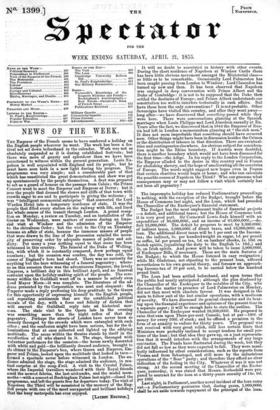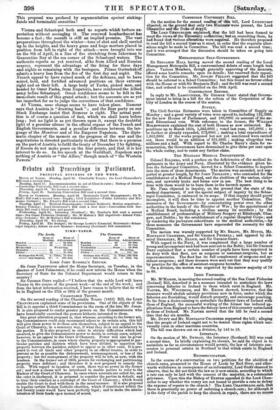The impromptu holiday has reduced Parliamentary proceedings to nothing, with
the exception of the Budget, brought before the House of Commons last night, and the Loan, which had preceded the Chancellor of the Exchequer's financial statement. The Budget has the most unpleasant traits of financial projects —a deficit, and additional taxes ; but the House of Commons took it in very good part. Sir Cornewall Lewis finds himself with an expenditure of 86,000,0001., and an income of 63,000,000/.,--de- ficit 23,000,0001. The deficit he proposes to meet by 3,300,0001. of indirect taxes, 2,000,0001. of direct taxes, and 16,000,0001. on loan. The additional direct taxes will be 1 per cent on the Income- tax; the indirect, 3s. per hundredweight on sugar, ld. per pound on coffee, 3d. per pound on tea, ld. on bankers' checks, ls. 10d. on Scotch spirits, (equalizing the duty to the English 7s. 10d.,) and 2s. on Irish spirits. And power will be taken to issue 3,000,000/. of Exchequer Bills, if necessary. These are the main features of the Budget ; to Which the House listened in easy resignation ; while Mr. Gladstone, not objecting to the present loan, adhered nevertheless to his own general theory, and foresaw an approach- ing Income-tax of 10 per cent, to be carried below the hundred pound limit. The Loan had been settled beforehand, and upon terms that the public had nearly anticipated ; although the plan disclosed by the Chancellor of the Exchequer to the notables of the City, who discussed the matter in presence of Lord Palmerston on Monday, did not then meet with absolute favour. It was designed in the main to follow suit of the last similar operations, with a modicum of novelty. We have discussed its general character and its bear- ing upon the financial experience and opinions of the present time in a separate paper ; it will be enough here to state the outline. The Chancellor of the Exchequer wanted 16,000,0001. He proposed to raise that sum upon Three-per-cent Consols, but at par-1001. of money for every 1001. of stock ; and he offered a premium in the form of an annuity to endure for thirty years. The proposal was not received with very great relish, still less certain hints that Ministers were probably inclined to accept tenders for small por- tions of the loan ; but that idea they gave up, on a just representa- tion that it would interfere with the arrangements of any large contractor. The Funds have fluctuated during the week, but they did not fall so low as they were expected to fall. They were mani- festly influenced by other considerations, such as the reports from Vienna and from Sebastopol, and still more by the industrious operations of the " Bear" party ; and therefore they afford no clear indication of the feeling in the City. Whatever it was it was not strong. At the second meeting of the Chancellor of the Exche- quer, yesterday, it was stated that Messrs. Rothschild were pre- pared to contract for the loan at a thirty-years annuity of 14s. 6d. per 100/. Last night, in Parliament, another novel incident of the loan came out—a Parliamentary guarantee that, during peace, 1,000,0001. shall be set aside towards repayment of the principal of the loan.
This proposal was prefaced by argumentation against sinking- funds and terminable annuities !



























